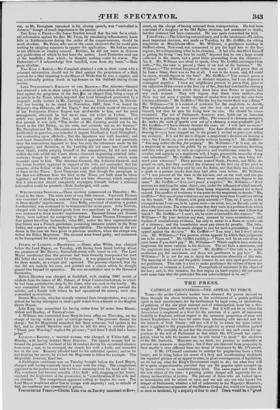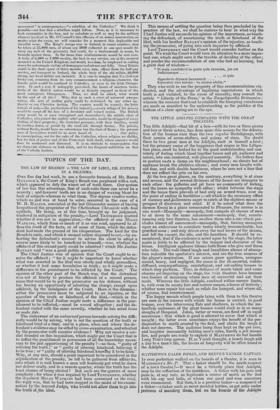CATHOLIC ASSOCIATION—THE APPEAL TO FORCE.
THE PRESS.
TIMES—So as the Catholic leaders have directed the power derived to them through the above institution, to the excitement of a purely political spirit in their countrymen, for the furtherance by legal votes, or resolutions, or petitions, of the one great national end of emancipation, none but a tho- rough-bred Orangeman will reproach them. But it will not be so where the Association is employed as a lever for the erection of a spirit of rancorous hostility to England, without regard to the immense proportion of wise and honest Englishmen who have for years been labouring with devoted zeal for the interests of Irish liberty: still less will it be so where the same instru- ment is applied to the preparation of the people for an armed rebellion against the law. We certainly do not fear the occurrence of any such cause for op- position to the will of Parliament as that which Mr. O'Connell has antici- pated, when he tells his hearers that he will resist "to death" the abolition of the 40s. freeholds. Ministers are, we think, too prudent to undertake at present any measure so impolitic ; but if they are deterred from proposing it, their motive is very different from any dread of resistance by Mr. O'Connell. . . . If Mr. O'Connell continues to indulge his pugnacious fancy a little longer, and to bring before the senses of a fiery and uncalculating multitude the repeated picture of an appeal to arms,in given contingencies of legislation, we do not say what the King's Government ought to do ; but what they will do is quite unquestionable, provided they see the popular spirit wrought up by these orators to an insurrectionary level. The salus populi will then be the sole object of the state : a pressing public danger will supersede the or- dinary technicalities of justice. The persons of those who are looked upon as incendiaries will be seized at once, and we ask any one who knows the temper of Parliament, whether a bill of indemnity to his Majesty's Ministers, and a simultaneous suspension of the Habeas Corpus Act, would not be passed, as soon as tendered, by a majority of four to one There would be a "great movement" in consequence,— "a rebellion of the Catholics." We think it possible—we fear that a rebellion might follow. Now, as it is necessary to look extremities in the face, and to calculate as well as may be the military chances involved in Mr. O'Connell's late effusion of an armed insurrection, no matter what the cause, we will consider for a moment this deplorable and dreadful issue. The King's troops now in Ireland, in round numbers, may be taken at 35,000 men, of whom any 3000 collected in one spot would de- stroy any mob of the peasantry that could, for a twelvemonth to come, be brought against them. In the mean time reinforcements would be sent over. A body of 6,000 or 7,000 cavalry, the best in any service, are at this moment mounted in the United Kingdom, and would, to a man, be employed in cutting down the unfortunate victims of demagogue turbulence and folly. Great Britain could in the short space of three months raise, arm, officer from the half-pay service, and transport to Ireland, the whole body of the old militia, 60,000 strong, her local militia not included. It is vain to imagine that if a civil war broke °id, assuming from its very commencement a religious character, the fanatic spirit would be confined to Catholics, or even to the Irish Orange- men. In such a wa:r, if unhappily provoked, the hearts of nineteen twen- tieths of the British nation would be as tiercely engaged as those of the
most outrageous Orangemen. Then, we shall be asked, what would be the end of all this ? Why, that in such a crisis of universal exaspe- ration, tile acts of neither party could be restrained by any sober au- thority or any Christian feeling. The country would be wasted ; the habi- tations of man,—the productions of his industry,—every refuge of his misery would be swept off the face of a desolated and ruined region. The British army would be at once triumphant and demoralized; the middle class of Catholics, who joined the nightly rebel ambuscades, would be stripped of every shilling of their property ; the wretched peasants, with their families, would be trodden down, or perish by the road-side through famine. The priests, without flocks, would have no subsistence but the alms of Rome; the present race of Associators would be no more heard of Our policy is emancipation, not for the sake of the Catholics, whose religion we dislike, but for that of justice and of the Protestant faith itself, whose enemies would thus be weakened and disarmed. It is an obstacle to emancipation that we deprecate violence on both sides, and its too frequent exhibition on that of the Catholic leaders.



















 Previous page
Previous page